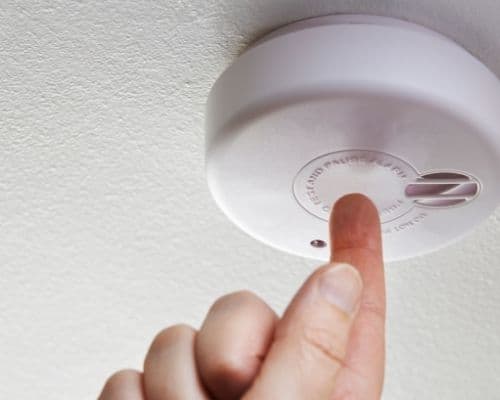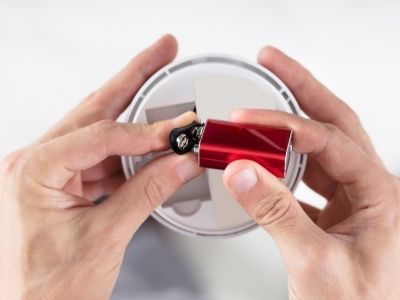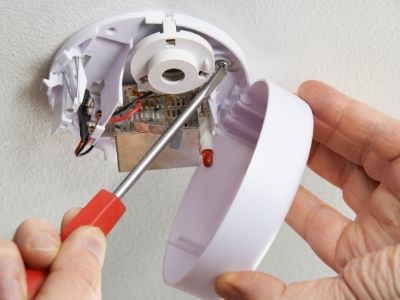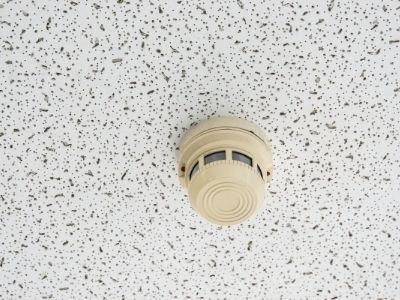You were sleeping soundly in your home when suddenly you hear it: a chirping sound. You write it off at first, then a minute later, you hear it again. It takes you a few minutes to realize it’s your smoke alarm, but there’s no smoke and definitely no fire. Why is your smoke alarm beeping?

Smoke alarms can go off even without smoke for any of the following reasons:
- Batteries need replacing
- High humidity in the room
- Dust or dirt buildup
- Bugs in the alarm
- Use of strong chemicals
- Oversensitivity
- Malfunction or breakage
In this article, we’ll further explain each of the above causes of a troublesome smoke alarm. We’ll also discuss when it’s time to replace your smoke alarm, so make sure you keep reading! It’s for your own safety.
Table of Contents
Common Reasons Your Smoke Alarm Is Going off Without Smoke or Fire
The Batteries Are Old
Smoke alarms, like carbon monoxide detectors, are life-saving devices that you probably don’t think about much in your day-to-day life. After all, your smoke alarm is suspended on the ceiling, and you don’t look up there very often.
What’s out of sight is usually out of mind. The inaccessibility of your smoke alarm can cause you to forget to change the batteries for far too long. By the time your smoke alarm is intermittently chirping at you, that’s a clear sign that the batteries need replacing.
We’ll talk a little later about how often to change smoke alarm batteries. Even if the batteries aren’t all that old, we’d recommend starting with a battery replacement since the alarm is chirping at you constantly. That alone could be enough to solve your issue.

If it isn’t, then you know your smoke alarm is reacting to the causes we’re going to discuss in the rest of this section.
The Room Is Very Humid
Humidity is moisture in the air. Although moisture and smoke are two very different things, to a smoke alarm, it’s not always so cut and dried. The smoke alarm perceives humidity a lot like smoke, and so it could begin screeching at you after you take a hot shower or when you boil water on the stove.
You can use a process of elimination to determine if humidity is your issue with the smoke alarm. If the alarm only goes off after you’ve been in the bathroom or kitchen for a while, then you have your culprit.
You should move your smoke alarm if you can so it’s further from the humidity. If that’s not possible, then you should strongly consider fans, vents, or even opening a window, anything that will create better ventilation for the warm, sticky air.
Buildup of Dust and/or Dirt
We talked earlier about how a forgotten smoke alarm can go too long without a battery change. When your smoke detector is the furthest thing from your mind, you can also forego cleaning it.
Both the internal and external components of the smoke alarm can get dirty. When they do, the buildup of grime can interrupt how the smoke alarm is supposed to function.
In some instances, the alarm can go off too often, which is annoying. In other cases, the alarm won’t chime even if there was smoke in the air. We’re sure we don’t have to tell you how dangerous this is!
At least annually, you need to climb a ladder to access your smoke alarm and clean it. You can use a vacuum brush attachment to suck up the dirt, dust, and other debris. Your smoke alarm should give you fewer problems from there.
Bugs Got into the Smoke Alarm
Some smoke alarms feature chamber entrances, which house a sensing chamber. Although you probably can’t even fit your finger into a chamber entrance, it’s sizable enough for bugs to slip through (although not overly large ones).
From there, the bug is trapped. As it flits about in a desperate attempt to escape, the bug can activate the sensors within the smoke alarm and make it begin beeping. If you had a loose bug in the house and you’re not sure where it went, and then your smoke alarm goes off, you could have your answer.
No products found.
Although cleaning the smoke alarm will rid it of any bug carcasses, you’re much better off stopping bugs at the source. Check the seals around your home, especially the windows and doors, and consider resealing them if they leave too many openings.
You can’t prevent every single bug that wants to enter your house, but resealing will keep a lot of them out. Now they can’t get in your smoke alarm.
Use of Strong Chemicals in the Room
You should also look at the products you use in your everyday life if your smoke alarm is still giving you a headache. Strong chemicals can trip the sensors, causing the alarm to go off without any sign of smoke.
When we say strong chemicals, by the way, we mean strong. Paints and stains, bleach, ammonia, drain cleaner; those kinds of chemicals will make your smoke alarm beep. Perfume and cologne likely wouldn’t unless used in high quantities.
If the smoke alarm goes off recurrently, then we recommend what we did before. Think of whatever you were doing each time the alarm sounds. If the instances are all related to strong scents, then you’ve found your issue.
Again, proper household ventilation will make a big difference here, even if the most you can do is open a window.
Alarm Oversensitivity
Today’s smoke alarms are smarter than ever. When there’s a slight accumulation of something in the air, such as humidity, the alarm is on alert. Certain smoke alarm models will read the temperature as well to determine if it’s rising with the instance of smoke.
These features can make smoke alarms oversensitive. Keeping that in mind, you should install your alarm in a place where it’s less susceptible to changes in temperature and moisture. We recommend keeping the alarm far away from the kitchen or the bathroom especially.
The Alarm Is Damaged or Broken
If you’re ruled out all the above reasons but your smoke alarm is still going off too often, then you have to consider that it could be in need of a replacement. The sensors in a smoke alarm only work for so long, after all. Then they can go haywire at anything and everything, which could be the predicament you’re facing now.

Smoke alarms can last between eight and 10 years, so if it’s been about that long or longer, then do yourself a favor and buy a new one. You’ll enjoy far greater peace of mind!
How Often Should You Change Your Smoke Alarm Battery?
At the top of our list, we mentioned that old smoke alarm batteries could be your chief culprit in your alarm making all that ruckus. We also said that we’d tell you just how often you should remove the batteries in the alarm and replace them, which we want to do now.
You should change your smoke detector batteries twice per year, or every six months. Most people change their smoke detector batteries when they change their clocks in the spring and fall. When you’re up there cleaning your smoke alarm, change out its batteries too. Then you’re killing two birds with one stone!
Some homeowners are a little more cautious and replace their smoke alarm batteries every six months. If you’ve had any issues with the alarm going off between the last time you replaced the batteries and now, then it’s not a bad idea to do it a little more often.
Most smoke alarms use standard nine-volt batteries, and those are the ones that last half a year to a full year. The higher-end smoke alarms on the market today might include a lithium battery. That’s good for 10 years, which is also the life of the entire smoke detector.
After a decade, rather than replace the battery, you should get rid of the smoke detector. In the interim, it’s nice to not have to worry about changing the battery of your smoke detector for a whole 10 years!
How Many Smoke Alarms Should You Have?
Throughout this entire article, we’ve talked about smoke alarms as singular entities, but please don’t assume that you only need one throughout your entire home. That’s not the case at all.
The National Fire Protection Association strongly advises homeowners to put one or more smoke alarms on each story or floor of the home, the basement included. You also want a smoke alarm in every bedroom in the house.
How Do You Know Your Smoke Alarm Is Not Working Properly?
The smoke alarm chiming until it gives you a headache is not the only sign that your alarm is on its way out. Here are some other signs to keep an eye open for.
The Smoke Alarm’s Sensitivity Has Increased
You were careful in where you put your smoke alarm so it wouldn’t pick up air and temperature changes unnecessarily. Yet lately, you can’t even toast a piece of bread without hearing that familiar and grating chiming sound from the smoke alarm.
An increase in sensitivity for no perceivable reason is one indication that the sensors in the smoke alarm are failing or soon will.
The Batteries Are Fresh But the Alarm Is Still Acting up
Replacing the batteries in your smoke detector is supposed to stop that beeping noise, so why is it persisting? Maybe you accidentally put old batteries in the smoke detector.
If you’re sure the batteries are fresh but they’re not making any difference in how your smoke alarm behaves, then you need to get rid of it ASAP. You can’t rely on the smoke alarm anymore, so if there really was smoke in the house, you might not even know it.
The Smoke Alarm Is Yellowed
Here’s an obvious sign that your smoke alarm has been in the house for far too long: its color. The casing on smoke alarms is usually white, so if time has faded yours to a dingy yellow, we’d bet the alarm is way older than 10 years.

When You Test It, the Alarm Isn’t Responsive
Ideally, you’re supposed to test a smoke alarm monthly to ensure it’s working as intended. If you test yours and it doesn’t make a peep, that’s just as concerning as when it won’t stop beeping. Again, it’s unreliable, so keeping the smoke alarm in your home is a safety risk.
How to Replace Your Smoke Alarm
After reading the last section, you decided to go out and buy a new smoke alarm or several. How do you install it?
Well, that depends on whether your smoke alarm is wall-mounted or hardwired. If it’s the former, then it’s easy enough to put it in place yourself. You only have to climb a ladder, take down the old alarm, and put the new one in its place. Insert batteries, test the smoke alarm, and then go about your life.
For hardwired smoke alarms, removing the current alarm and installing a new one will be tough to DIY unless you have prior electrical experience. We recommend calling a pro.
Since smoke can rise, a smoke alarm should be on the ceiling, not the wall, despite that many alarms are labeled as being wall-mounted. The ideal location for the smoke alarm is four inches from the closest wall and away from ceiling and wall corners.
Conclusion
Smoke alarms can sometimes go off even with no smoke in the house. This can occur for a multitude of reasons, everything from interior humidity to bugs getting trapped inside the alarm.
We hope this article helped you better understand your smoke alarms so you can maintain them and keep a safe, happy home!